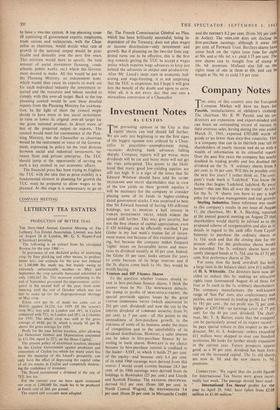Investment Notes
fly CUSTOS
THE prevailing opinion in the City is that equity shares can and should fall further. We are only just beginning to see the first signs of the biggest squeeze ever ordered by a Chan- cellor in peacetime-unemployment rising, vacancies declining, bank advances falling sharply. Company reports will get worse, more dividends will be cut and many more will not get the rises anticipated. This points to the likeli- hood that many good low-yielding equities are still too high. It is a sign of the times that Sir Edward Wilshaw should have told his GLOBE TELEGRAPH AND TRUST shareholders that in view of the low yields on these 'growth' equities it will be necessary for the company to consider placing some of its funds in higher-yielding dated government stocks. I was surprised to hear that Sir Edward boasted of having 430 different holdings, not to mention a half interest in CABLES INVESTMENT TRUST, which widens the spread still further. This may give security, but not the best chance of capital appreciation, even if 430 holdings can be efficiently watched. I put Globe in my last week's trustee list of invest- ment trusts, not because of this excessive spread- ing, but because the company makes frequent 'rights' issues on favourable terms and main- tains its dividend steadily at JO per cent. Indeed, the Globe 10 per cent. looks certain for years to come because of its large reserves and if the 5s. shares come back to 16s. they would be worth buying.
Trustees and HP Finance Shares
To the question whether trustees should in- vest in hire-purchase finance shares, I think the answer must be No. The BOWMAKER debacle, the slump in profits of MERCANTILE,CREDIT, the special provision against losses by the great UNITED DOMINIONS TRUST (which uncovered its 261 per cent. dividend) and now the cut in "the interim dividend of LOMBARD BANKING from 91 per cent. to 5 per cent.-all this points to the unsteadiness of hire-purchase growth, to the riskiness of some of its business under the stress of competition and to the unreliability of its dividend distributions. However, a safer interest can be taken in hire-purchase finance by in- vesting in bank shares. BARCLAYS is my choice because its hire-purchase interest is confined to the leader-UDT, in which it holds 25 per cent. of the equity-and because only 6.4 per cent. of its total 1960 earnings were derived from this source. I would avoid LLOYDS because 24.3 per cent. of its 1960 earnings were derived from its holdings in Bowmaker (25 per cent.) and Lloyds and Scottish Finance. The NATIONAL PROVINCIAL derived 10.2 per cent. (from 100 per cent. in North Central Wagon), the WESTMINSTER 3.6 per cent. (from 20 per cent. in Mercantile Credit) and the DISTRICT 8.2 per cent. (from 303 per cent in Astley). The MIDLAND does not disclose its hire-purchase earnings, although it owns II per cent. of Forward [rust. Barclays shares have come back on the rights issue (one for eight at 50s. and at 68s. 6d. x.r. yield 3.75 per cent. The new shares can be bought free of stamp at I8s. 6d. premium. Midland also fell on the rights issue of one in three at 60s. and can be bought at 76s. 9d to yield 3.9 per cent.


































 Previous page
Previous page